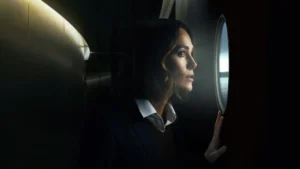Summary
Huge scale, gripping and ambitious sci-fi spy thriller from Christopher Nolan, which simply has to be seen to be believed, and possibly seen more than once to be fully appreciated.
I was very wary going in to see Tenet this evening: was I going to be seduced by the hype? Was I going to love it tonight and then wake up feeling different? Was I going to be utterly baffled and leave the cinema feeling ignorant? OK, let’s see, I thought: I’ll simply watch the film, roll with it and only then will I know whether I want to see it again, need to see it again, or never want to see it again.
Now, two hours after leaving the cinema, my head is no longer spinning, but I am still feeling a little high with admiration. For the most part, this is admiration for the writing and for the structure of the film. There was very little to the characters, a huge amount of explanation (more given than needed), and Branagh’s character should have been played by someone from the Ukraine or Russia, but these flaws all felt small compared to the overall gobsmackingness of the writing. (And actually, what seemed like flaws at first may have fitted with the genres of the film, on second thoughts; bear with me.)
Tenet is an odd word to choose for the title of this film: in case you didn’t know, it means “a principle, belief, or doctrine”; but the film Tenet is not about beliefs. It is about a man, an unnamed Protagonist (John David Washington, BlacKkKlansman) commissioned to hunt down the threat of something potentially worse than World War III and stop it. It is a spy thriller, an intellectual science fiction film, and a massive scale, action-filled spectacle.
I’ve said before that what makes a film “great” for me is how it makes me feel. Tenet’s success was not so much the adrenaline, or excitement in seeing pieces fall into place, but rather the steady development of those pieces. We’re given a couple of essential characters and a central premise of the story, watch how those people handle it; then we spot something neat about how it’s used and start grinning. But then, it gets used in an unexpected way, or a bigger way, or a sideways way; and we spot something neat but subtle, or mindblowing and unsubtle. And then it gets bigger again, with radical connections and woah moments aplenty; and I have a feeling there are more of those to be found when I watch it again, the film is simply so fast to catch everything in one go.
The “it” I’ve been talking about, the central premise, is that some objects and indeed people can have their entropy “inverted”; and that taken to the nth degree, this discovery can lead to the destruction of everything. (This is not news if you’ve seen any of the several trailers, and is demonstrated about fifteen minutes into Tenet.) Watching a close combat fight taking place with one party engaged in reverse motion is entertaining and damned impressive – especially when you read that everything was done for real, with minimal camera tricks – and you have to tell yourself how to understand what you’re seeing; a revelation that felt a little like the one when Dr. Banks in Arrival grasped how the visitors communicated. You think that’s something, and then you see the car chase with an “inverted” car involved. The real payback comes later when the film folds back on itself and scenes like these are presented again from the point of view of the person who has been “inverted”.

The style of Tenet is very much that of an action-packed spy film; indeed the first ten minutes had me thinking Washington had just passed a James Bond audition. There are secret assignations, bungee assaults into a building, balaclavas, guns, and very sharp suits. Of course, there is the time-reversing thing, but Tenet doesn’t feel like science fiction at all: there is nothing futuristic about the sets, and very little high tech on display: the sci-fi is in the content, not the look of this film. Oh but it’s fast: not just the action, but the talking, the exposition, the moving from scene to scene, country to country. This and the shallow characterization both add to the spy genre atmosphere.
The special effects, as I’ve mentioned are remarkable, both in terms of scale – the infamous airplane crash – and mechanics. Dazzling to watch, and beautifully put together, I would hope editor Jennifer Lame is at least nominated for an Oscar. Along with the writing and effects, the editing and Hoyte Van Hoytema’s cinematography are in my opinion the real skills of Tenet.
Yes, this might seem odd, but I don’t rate the people – characters nor cast – of Tenet terribly high up. The Protagonist himself is largely following his CIA nose and Washington’s stamina is more impressive than his acting. Kenneth Branagh makes an almost Gerard Butler-style scowling alpha male. Robert Pattinson’s Neil is the most entertaining person to watch, with lovely banter chemistry as he and the Protagonist get to know each other and work together more. The only one who shows some development – as though resisting being more than just a pawn – is Elizabeth Debicki’s Kat: damsel in distress, abused spouse, or arms dealer’s moll, there are several sides to her, and she clearly craves independence for herself and her son, leading her to take more and more risks. All these people are the perfect dramatis personae for a pulp fiction romp, which this surely is, despite its high budget and gloss.
The only real problem which hampered my enjoyment of Tenet (and the reason I couldn’t give it top marks) was the sound: great, dramatic soundtrack, sure, but there was simply too much of it. Whether it was simply heavy bass, background noise, or the combination, there were many times that the sound overpowered the dialogue, or the dialogue simply seemed a little fuzzy in comparison to everything else. There is so much to capture in the convoluted plot, we shouldn’t have to strain to make out what people are saying as well.
Tenet was a simply wonderful experience, and I hope to see it again very soon. But there was something sad about the experience too, to do with timing, rather than time: even though I watched the film at a peak time on the opening night, there were only about twenty people in the auditorium. When my son and I saw Black Panther a couple of years ago, the same cinema was struggling to fit everyone in. If only Tenet had been released without the shadow of a global pandemic: such a small audience is almost an insult to such a huge and high-quality production.




